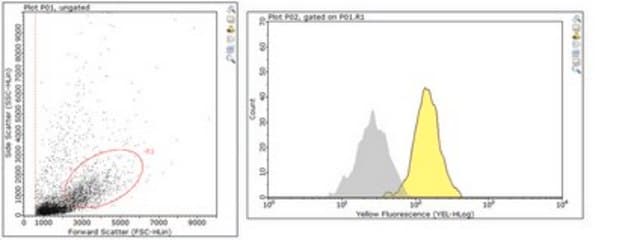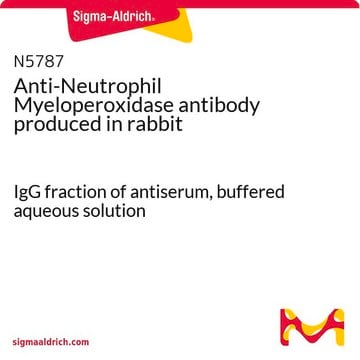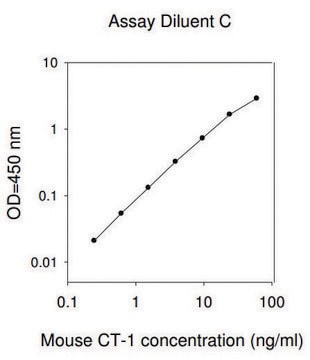RAB0374
Mouse MPO ELISA Kit
for plasma and cell culture supernatant
Sinónimos:
MPO, Myeloperoxidase
Iniciar sesiónpara Ver la Fijación de precios por contrato y de la organización
About This Item
UNSPSC Code:
41116158
NACRES:
NA.32
Productos recomendados
species reactivity
mouse
packaging
kit of 96 wells (12 strips x 8 wells)
technique(s)
ELISA: suitable
capture ELISA: suitable
input
sample type cell culture supernatant(s)
sample type plasma
assay range
inter-assay cv: <12%
intra-assay cv: <10%
sensitivity: 600 pg/mL
standard curve range: 0.61-150 ng/mL
detection method
colorimetric
shipped in
wet ice
storage temp.
−20°C
Gene Information
mouse ... Mpo(17523)
General description
The Mouse MPO (Myeloperoxidase) ELISA (Enzyme- Linked Immunosorbent Assay) kit is an in vitro enzyme-linked immunosorbent assay for the quantitative measurement of mouse MPO in plasma and cell culture supernatants.
Immunogen
Recombinant Mouse Myeloperoxidase
application
For research use only. Not for use in diagnostic procedures.
Please refer to the attached General ELISA KIT Procedure (sandwich, competitive & Indirect ELISA)
Please refer to the attached General ELISA KIT Procedure (sandwich, competitive & Indirect ELISA)
Biochem/physiol Actions
Myeloperoxidase (MPO) has a crucial role to play in the destruction of various microorganisms and foreign cells, such as bacteria, fungi, viruses, red cells, and malignant and nonmalignant nucleated cells. MPO catalyzes the production of number of reactive oxidant species (ROS) that influence tissue damage during inflammation. MPO and its downstream inflammatory pathways function as a potent therapeutic target for prophylaxis of atherosclerotic cardiovascular disease. MPO catalyzes the synthesis of polychlorinated dibenzo(p)dioxins and furans (PCDD/F) from precursors such as chlorophenols in the presence of hydrogen peroxide (H2O2).
Other Notes
A sample Certificate of Analysis is available for this product.
Please type the word sample in the text box provided for lot number.
Please type the word sample in the text box provided for lot number.
Los componentes del kit también están disponibles por separado
Referencia del producto
Descripción
SDS
signalword
Warning
hcodes
pcodes
Hazard Classifications
Met. Corr. 1
Storage Class
8A - Combustible corrosive hazardous materials
Elija entre una de las versiones más recientes:
¿Ya tiene este producto?
Encuentre la documentación para los productos que ha comprado recientemente en la Biblioteca de documentos.
Nour Eissa et al.
Scientific reports, 7, 42427-42427 (2017-02-12)
2,4-Dinitrobenzene sulfonic acid (DNBS)-induced colitis is an experimental model that mimics Crohn's disease. Appropriateness of reference genes is crucial for RT-qPCR. This is the first study to determine the stability of reference gene expression (RGE) in mice treated with DNBS.
Clinical manifestation of myeloperoxidase deficiency.
Lanza F, et al.
Journal of Molecular Medicine, 76, 676-681 (1998)
Sebastian Mayer-Rollnik et al.
European journal of anaesthesiology, 37(3), 180-186 (2019-12-05)
Postoperative autologous retransfusion of drainage blood might reduce the transfusion of red blood cell concentrates after major orthopaedic surgery. Our primary objective was to evaluate the effectiveness of a blood collection and retransfusion system. Secondary objectives included safety issues and
Myeloperoxidase and cardiovascular disease.
Nicholls SJ and Hazen SL
Arteriosclerosis, Thrombosis, and Vascular Biology, 25, 1102-1111 (2005)
Myeloperoxidase-catalyzed formation of PCDD/F from chlorophenols.
Wittsiepe J, et al.
Chemosphere, 40, 963-968 (2000)
Nuestro equipo de científicos tiene experiencia en todas las áreas de investigación: Ciencias de la vida, Ciencia de los materiales, Síntesis química, Cromatografía, Analítica y muchas otras.
Póngase en contacto con el Servicio técnico







